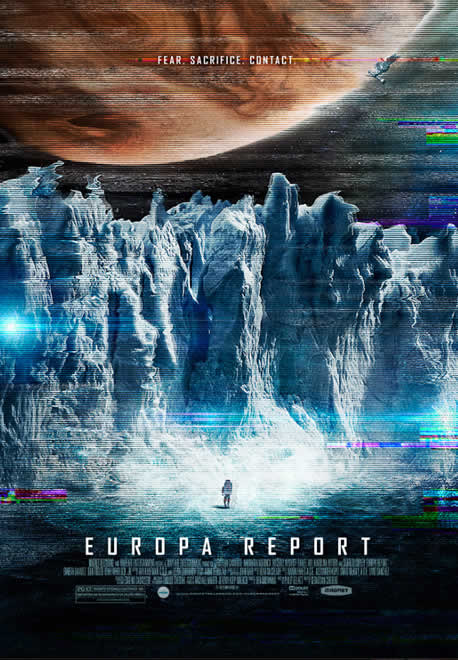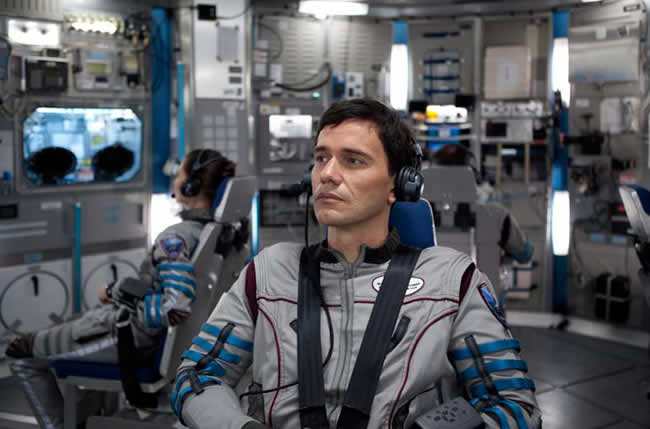 A unique documentary-style science fiction thriller, EUROPA REPORT follows a contemporary mission to Jupiter’s moon Europa to investigate the possible existence of alien life within our solar system. When unmanned probes suggest that a hidden ocean could exist underneath Europa’s icy surface and may contain single-celled life, Europa Ventures, a privately funded space exploration company, sends six of the best astronauts from around the world to confirm the data and explore the revolutionary discoveries that may lie in the Europan ocean.
A unique documentary-style science fiction thriller, EUROPA REPORT follows a contemporary mission to Jupiter’s moon Europa to investigate the possible existence of alien life within our solar system. When unmanned probes suggest that a hidden ocean could exist underneath Europa’s icy surface and may contain single-celled life, Europa Ventures, a privately funded space exploration company, sends six of the best astronauts from around the world to confirm the data and explore the revolutionary discoveries that may lie in the Europan ocean.
After a near-catastrophic technical failure that leads to loss of communication with Earth and the tragic death of a crewmember, the surviving astronauts must overcome the psychological and physical toll of deep space travel, and survive a discovery on Europa more profound than they had ever imagined.
Bijan Tehrani: This is a very interesting film to watch actually and I was wondering how you came up with the idea of EUROPA REPORT?
Sebastian Cordero: It’s funny, it wasn’t my idea originally, I came on board of the project when there was already a script that existed a script that was written by Phillip Gelatt, I was very lucky that I was considered for this project because it is not at all in the style or the genre of the films that I have done before, I am a filmmaker from Ecuador and I have done several films there that have been very successful on the festival circuit in my country and in Latin America but this is my first English language film and the type of story, a sci-fi film, was a complete departure for me but I think the one of the reasons, what attracted me to the project was that it was a really fascinating story the wonder of the danger behind space travel and stories like this told on one hand a very scientific approach but at the same time a very human approach which was really appealing and I think the producers when I read the script and I pitched them my idea they probably saw that I am very much an actors director, I am very concerned about performances about getting an actor where he should go in terms of helping the film flow, I really feel that this film without this cast and without the way they work together could fall apart very easily and I think it was a mixture of things. Also personally, when I was a teenager its not obvious but I was a big science fiction fan, I read a lot of science fiction when I was a teenager from Asimov, Arthur C Clarke, Ray Bradbury, all of those really short stories really appealed to me, so in a way when I read this I felt that I could come back to some of the things that I loved when I was a teenager.
BT: You can see the trace of Ray Bradbury’s storytelling, which is putting a human face on science fiction.
SC: What is fascinating about science fiction is that through a story and in a setting that feels far away or what have you, you really can connect to all the issues that are the crucial issues as human beings, how do we deal with our own mortality, how do we sacrifice how do we decide what is worth sacrificing for the greater good, things that are some of the big questions that we all have at one point or another, a story like this that allows you to illustrate some of those while at the same time telling a story that can be thrilling and entertaining and that can also teach you something.
BT: How did you go about the casting EUROPA REPORT?
SC: I was very lucky because, first of all the project called for an international cast, this crew of astronauts in the near future and it is a private adventure and the casting happened naturally. There were some really great options I worked with a terrific casting director, Adi Kauffman who is a real visionary in what she does and together we were able to assemble a really interesting cast. The first one who came on board was Michael Nyqvist, he read the script early on he loved the potential of it, he saw my work, we had a great conversation and he came on board, it is great with actors, once you have a great actor on board he acts like a magnet and the other actors suddenly get interested, Sharito Copley for instance he was really thrilled to work with Nyqvist the science fiction element all of that was something that really appealed to him and Anamaria Marinca, the Romanian actress was on my wish list from the day I read the screenplay, which is unusual because all of her films have been very dramatic, however for her to do a science fiction was a huge departure it was very different and she was thrilled with the idea of doing that, so gradually the whole cast came together, Daniel Wu who plays William, the Chinese Commander of the ship, he is a huge star in China this is his first English language film and everyone responded so well to the story and the potential of the script as well as the fact that the script was very respectful of science and respectful of what a real space exploration would be.
BT: How did you come up with the visual style of the film?
SC: It was actually an interesting style for many reasons on one hand the film is in the found footage genre, you are watching everything from the existing cameras in the ship and usually we associate found footage with the hand held shaky bad quality home video, but this was very sophisticated high tech and very early on I said ok we should even go very extreme and go with still cameras and not use the usual tools or tricks we have in terms of filming. The director of photography Enrique Chediak, he had worked on two of my previous films, he was very attracted to all of the restrictions that we were going to have with this and how that would effect and what that would make us do creatively, the tools we would have because you don’t push into a close up, no you need to have the actor come into the close up and it would have to be organic it has to feel natural, if the camera breaks down and suddenly the focus is broken and you can’t focus and you only focus on the objects that are very close to the camera then the tension that it gives you is tremendous and it is something that normally you would be able to do, it would just be a mistake in another film. So suddenly you are thinking more scientifically on why the camera would be placed here because sometimes the person who designed the ships would say that this is the right spot to capture this or that and it not necessarily an aesthetic decision it is just a scientific decision, suddenly you are thinking in a different way and the film can still be gorgeous. It’s just a different approach and a different path and it makes the film quite unique.
BT: I think this I one of the most internationally appealing films ever made/
SC: It probably is, the cast is obviously very international, the creative team, I am from Ecuador, Enrique the DP is also from Ecuador, the production designer who worked on Pan’s Labyrinth, the costume designer is from Mexico, the first AD was Turkish, the producer Ben Browning is British, I love that, I think that film is and should be international and when a project like this comes together its really nice and it was all show in New York in a sound stage which is also a very international city, so it was great. What is great about it is that you have a collection of different viewpoints and perspective and it made sense for this film.

